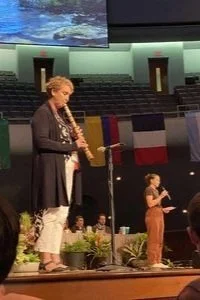“To know me is to breathe with me.
To breathe with me is to listen deeply.
To listen deeply is to connect.
It’s the sound of deep calling to deep.
Dadirri—the deep inner spring inside us.
We call on it, and it calls on us.”
— Miriam-Rose Ungunmerr
“It would be good if we could share an Indigenous perspective at one of our Moments of Blessing,” someone said during a Zoom meeting in the lead-up to World Conference. Immediately, my thoughts turned to the words of Miriam-Rose Ungunmerr. Her reflection on Dadirri—the quiet, deep listening of the heart—captured the deepest prayer I held for our gathering: that we would embody what it means to be a worldwide people who know God as an intimate companion. That we might offer a vision of a table of friendship, creativity, and generosity—where people of many cultures and languages gather side by side, each bringing their own stories, songs, and Spirit.
As part of the Moment of Blessing team, our role was to support the First Presidency during legislative sessions. We were to remain alert and prayerful throughout, prepared to step in at a moment’s notice—especially when there was a pause in proceedings or when Stassi sensed the need for a moment of grace. We offered these interludes through prayer, music, meditation, or song.
In preparation, I created a short video of gentle waves washing up on the lake shore at the Green Cathedral. It would serve as a visual backdrop during our ‘moment of blessing’. We rehearsed with the tech team, but truthfully, we weren’t sure how it would be received.
When the moment arrived, Annie Falcke shared the words of Miriam-Rose aloud, and I played my shakuhachi, a Japanese bamboo flute. We offered it not as performance, but as prayer.
Someone later shared with me, “That moment of blessing was maybe my favourite moment of World Conference.”
It was a quiet confirmation to me of the Spirit’s presence.
But that wasn’t the only moment of blessing I experienced.
I had travelled to Independence early, with a beginner’s mind—open to the unplanned, the quiet, the relational. One morning, a week before Conference began, I found myself alone on the Auditorium stage, flute in hand. I played in silence, offering an unspoken prayer for the days ahead.
The quiet didn’t last long.
“Great, your mum is here!” someone called out. And just like that, I was making art.
First, I was invited to create an installation in the Temple. I was given bolts of coloured fabric—yellow, pink, purple, and orange—symbolising the fire of Pentecost. I decided to craft a flock of doves, representing the many ways we each carry the Spirit of God with us as we gather.
Next came the World Plaza, the outdoor space beside the Temple where evening festivities were to be held. I took in the place: the gentle curve of trees framing the area, a natural perimeter that seemed to call for something playful and spacious. I imagined long, floating curtains hanging between the trees—something that might catch the breeze and the attention of children.
“It would be great if the children could respond to whatever you construct,” someone said.
I began working, metres and metres of fabric piling up around me. The task felt immense. I began to doubt whether it was possible.
“We’ll get the Tahitians to help you,” someone offered.
And sure enough, the next morning, six beautiful women from Tahiti and France arrived, bringing their gifts of song, laughter, and joy. We worked together, and something lovely emerged.
That’s the rhythm of World Conference. You can’t connect with everyone. So you simply offer yourself where you are. You show up to what is needed, and let the rest unfold.
I supported my daughter Erin as she tackled the huge task of coordinating volunteers to receive the offering each day. I said yes to small things. I watched for quiet moments. I stayed open.
I took time to talk with strangers.
“Thanks for saving me,” one said.
“We saved each other,” I replied.
Hope shimmered through the week.
Sometimes it showed up bold and bright—in worship, in workshops, in the energy of debate. It danced through conversations, erupted in singing, pulsed in the shared laughter of connection, in the ordination of our new Prophet-President Stassi Cramm, and in the calling of Bunda Chibwe—our first African minister called to the First Presidency.
Other times, it arrived like breath:
A whispered prayer.
A consensus reached on deep matters of justice.
A soft, heart-felt expression of thousands of voices singing Spirit of the living God, fall a fresh on me.
These were not just formalities. They were living, breathing moments of grace.
And now, back home, I carry the same invitation:
Let us choose hope—wherever we live.
Let us trust in its quiet unfolding.
Not because we know exactly where we’re going,
But because we believe love matters.
Connection matters.
And that something sacred can still rise
from the deep inner spring that calls to us,
and through us out into the world.
Anne Bonnefin





